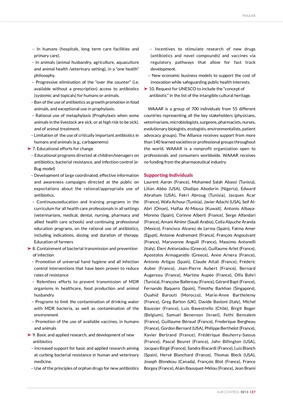
- In humans (hospitals, long term care facilities and
primary care).
- In animals (animal husbandry, agriculture, aquaculture
and animal health /veterinary setting), in a "one health"
philosophy.
- Progressive elimination of the "over the counter" (i.e.
available without a prescription) access to antibiotics
(systemic and topicals) for humans or animals.
- Ban of the use of antibiotics as growth promotion in food
animals, and exceptional use in prophylaxis.
- Rational use of metaphylaxis (Prophylaxis when some
animals in the livestock are sick, or at high risk to be sick),
and of animal treatment.
- Limitation of the use of critically important antibiotics in
humans and animals (e.g., carbapenems)
‰ 7. Educational efforts for change
- Educational programs directed at children/teenagers on
antibiotics, bacterial resistance, and infection control (eBug
model)
- Development of large coordinated, effective information
and awareness campaigns directed at the public on
expectations about the rational/appropriate use of
antibiotics.
- Continuouseducation and training programs in the
curriculum for all health care professionals in all settings
(veterinarians, medical, dental, nursing, pharmacy and
allied health care schools) and continuing professional
education programs, on the rational use of antibiotics,
including indications, dosing and duration of therapy.
Education of farmers
‰ 8. Containment of bacterial transmission and prevention
of infection
- Promotion of universal hand hygiene and all infection
control interventions that have been proven to reduce
rates of resistance
- Relentless efforts to prevent transmission of MDR
organisms in healthcare, food production and animal
husbandry
- Programs to limit the contamination of drinking water
with MDR bacteria, as well as contamination of the
environment
- Promotion of the use of available vaccines, in humans
and animals
‰ 9. Basic and applied research, and development of new
antibiotics
- Increased support for basic and applied research aiming
at curbing bacterial resistance in human and veterinary
medicine.
- Use of the principles of orphan drugs for new antibiotics
- Incentives to stimulate research of new drugs
(antibiotics and novel compounds) and vaccines via
regulatory pathways that allow for fast track
development.
- New economic business models to support the cost of
innovation while safeguarding public health interests.
‰ 10. Request for UNESCO to include the "concept of
antibiotic" in the list of the intangible cultural heritage.
WAAAR is a group of 700 individuals from 55 different
countries representing all the key stakeholders (physicians,
veterinarians, microbiologists, surgeons, pharmacists, nurses,
evolutionary biologists, ecologists, environmentalists, patient
advocacy groups). The Alliance receives support from more
than 140 learned societies or professional groups throughout
the world. WAAAR is a nonprofit organization open to
professionals and consumers worldwide. WAAAR receives
no funding from the pharmaceutical industry
Supporting Individuals
Laurent Aaron (France), Mohamed Salah Abassi (Tunisia),
Lilian Abbo (USA), Oladipo Aboderin (Nigeria), Edward
Abraham (USA), Fekri Abroug (Tunisia), Jacques Acar
(France), Wafa Achour (Tunisia), Javier Adachi (USA), Seif AlAbri
(Oman), Haifaa Al-Mousa (Kuwait), Antonio AlbayaMoreno
(Spain), Corinne Alberti (France), Serge Alfandari
(France), Amani Alnimr (Saudi Arabia), Celia Alpuche Aranda
(Mexico), Francisco Alvarez de Lerma (Spain), Fatma Amer
(Egypt), Antoine Andremont (France), François Angoulvant
(France), Maryvonne Anguill (France), Massimo Antonelli
(Italy), Eleni Antoniadou (Greece), Guillaume Arlet (France),
Apostolos Armaganidis (Greece), Anne Arnera (France),
Antonio Artigas (Spain), Claude Attali (France), Fréderic
Auber (France), Jean-Pierre Aubert (France), Bernard
Augereau (France), Martine Aupée (France), Olfa Bahri
(Tunisia), Françoise Ballereau (France), Gérard Bapt (France),
Fernando Baquero (Spain), Timothy Barkhan (Singapore),
Ouahid Barouti (Morocco), Marie-Anne Barthelemy
(France), Greg Barton (UK), Davide Bastoni (Italy), Michel
Baussier (France), Luis Bavestrello (Chile), Birgit Beger
(Belgium), Samuel Benenson (Israel), Fethi Bensalem
(France), Guillaume Béraud (France), Frederique Bergheau
(France), Gordon Bernard (USA), Philippe Berthelot (France),
Xavier Bertrand (France), Frédérique Beuhorry-Sassus
(France), Pascal Beuret (France), John Billington (USA),
Jacques Birgé (France), Sandra Biscardi (France), Luis Blanch
(Spain), Hervé Blanchard (France), Thomas Bleck (USA),
Joseph Blondeau (Canada), François Blot (France), France
Borgey (France), Alain Bousquet-Mélou (France), Jean Brami
WAAAR
AMR CONTROL 2015 127